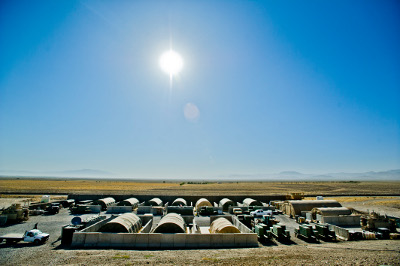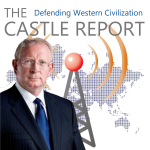Executive
Afghanistan – a new strategy

.Hello this is Darrell Castle with today’s Castle Report. Today is Friday September 1, 2017, and on today’s report I will be discussing President Trump’s speech, given on August 21, in which he discussed “our path forward in Afghanistan.” He stated that his gut instinct told him to leave Afghanistan, and he likes to follow his instincts, but sitting behind the desk in the oval office gives one a perspective that he cannot see otherwise.
Afghanistan: a long history of imperial failure
The United States, with Donald Trump as President, is not the first empire to attempt to conquer, pacify, or force to the bargaining table the Afghan people, in whatever political form they existed at that time. The armies of Alexander the Great, Genghis Khan, the Mongols, the British Empire, and the Soviet Union have all been broken or blunted on the rugged terrain, history, and religious fervor that make up Afghanistan. Now Donald Trump has been convinced that he is different from the others and his investment of thousands of more troops will make the difference. Perhaps he missed history at Fordham and the Wharton School. That’s really sad because the people he is committing to battle are our future, our sons and daughters are being thrown into this “new strategy.”
So, it looks as if the new strategy is the same as the old strategy. Meet the new boss, same as the old boss, at least in this regard. Your gut instinct was correct, Mr. President, and you should follow it. You criticized President Obama for his no-win wars, and now you announce a strategy to do essentially the same, except with a few meaningless changes. During the campaign you stated that Ron Paul was right—that we should never have gone into Afghanistan. What happened to that opinion, Mr. President? I imagine that it disappeared when all those Generals appeared in your administration.
General officers who don’t win
These are all Generals who have never won a war. They all have sterling combat records but were dispatched to fight endless no-win wars, and perhaps that clouds their perspective. We seek victory in Afghanistan, the President said, but we can’t seem to define what victory even is. How will we know it when we see it? Who was the last General to have actually won a war and, therefore, would know victory when he saw it. The World War ll generals led by General Eisenhower, I suppose, and that was 72 years ago. Richard Nixon, by some accounts, said Ike would be able to control the Generals because he had served as a General and would not let them intimidate him, but most presidents would be.
More than 70 years of fighting and dying, but never being able to sail into the enemy’s harbor to accept surrender, has to affect the psyche of career officers service-wide. The President spent several minutes of his speech complimenting the military and saying how grateful we are etc., but apparently he intends to continue using them in the same way.
Three fundamental conclusions
Trying to win the unwinnable
He said that he had arrived at three fundamental conclusions about America’s core interests in Afghanistan. First, “our nation must seek an honorable and enduring outcome worthy of the tremendous sacrifices that have been made.” That is an impossible goal unless he wants to commit American troops to Afghanistan permanently. Perhaps that is what he means, i.e., to have Americans in protected enclaves in firebases around Afghanistan forever. But I don’t think so. No, I think he is talking about the same strategy that failed in Vietnam. That is to make it so costly in lives for the Taliban that they are anxious to enter into negotiations for some type of power-sharing arrangement. Number one, that sounds a lot like the political arrangement that existed before we got there. Number two it won’t work.
The enemy forces in Afghanistan will never negotiate in earnest. Why should they negotiate when they can wait us out until we finally get sick of it or until we have a bigger more costly war on some other side of the world? They may sign some power-sharing agreement, as the North Vietnamese did, and then they will violate it as soon as American forces leave, just as the North Vietnamese did.
How rapid an exit?
Second, he said that “the consequences of a rapid exit are both predictable and unacceptable.” Rapid exit, indeed. Sixteen years now with several thousand American lives and about a trillion dollars in treasure expended already. What would a slow exit look like? I’ve got a feeling we’re about to find out. He went on to explain how the 9/11 terrorists trained there. He pointed out that we can’t let them use it as a base again. No mention of the fact that President Obama’s and Hillary Clinton’s actions in Libya turned that country into a lawless state. It is currently home to one of the world’s biggest terrorist training bases. So terrorists already have safe havens in which to train. No mention of the fact that the 9/11 terrorists actually were almost all from Saudi Arabia.
Security threats, real and imaginary
Third, “the security threats we face in Afghanistan and the broader region are immense.” Ok, so we are right back to where we started. How did we get in this mess and how do we get out of it? Aren’t the people President Trump has surrounded himself with, generals and civilians alike, at least partially responsible for where we are now? Shouldn’t we therefore consider a different strategy, one closer akin to the strategy announced in the campaign i.e., leave immediately.
President Trump made much of his willingness to let battlefield commanders make decisions in the field about how to conduct the war. I applaud that. Civilians in Washington cannot micromanage tactical decisions 7 or 8 thousands of miles away, at least in a competent manner. However, that is a lot different from letting them actually enact strategy that affects the long term direction of United States foreign policy. Our system requires civilian control of the military not the other way around.
Good ideas to start with
The President had some good ideas during his campaign. He might not have expressed them that well but still, a breath of fresh air. Ideas like the Afghanistan adventure is wasting our money, it is a total disaster. What are we doing there, the people hate us. We should leave Afghanistan immediately. No more losing, endless wars. No more strangling regulations. And no more bad deals with other countries. He called it “America First”. I took that to mean that he would put the interests of America ahead of the deep state military, foreign policy, warfare, welfare cabal that has controlled U.S. policy, for so long. Those are the ideas that made people vote for Donald Trump but, oh well.
There was a better deal coming to America, the art of the deal, from the master dealmaker himself. It would have worked too, and that’s why the American people elected him. In his speech he told us that things take on a different perspective when you sit behind that desk. Yes, the perspective is very different when you look across the desk and all you see are deep state military and corporate reps with a few conservative incorporated, crony capitalists supporting politicians thrown in.
The Deep State
What gives the deep state its entrenched power? What has allowed it to become so powerful that it no longer matters who holds political office. The deep state controls it all and keeps us under control through its complete ownership of virtually all mass media. It does it all by way of the debt-based or credit- based money system created by the Federal Reserve Act, passed by Congress on Christmas Eve, 1913. The endless supply of fake money allows politicians freedom from monetary and even moral restraint.
They don’t have to care about the debt. Who cares how high it goes, we can always borrow more. No one gives a thought to what another trillion for Afghanistan means. Just add it to the debt. Keep in mind that the debt ceiling expires in four weeks. A new increase will have to pass or theoretically the government would shut down.
Finally folks:
No Constitutional authority
I would be remiss if I didn’t also point out that no Constitutional authority exists for the Federal Reserve or for wars such as Afghanistan.
Cut off the fake money and foreign adventures will start to cease because there will be no way to pay for them. Sanity will return to politics and the American economy will boom with jobs. Fake money is the key. If we want change other than just more words and promises, the money system must change first.
At least that’s the way I see it,
Until next time folks,
This is Darrell Castle,
Darrell Castle is an attorney in Memphis, Tennessee, a former USMC Combat Officer, 2008 Vice Presidential nominee, and 2016 Presidential nominee. Darrell gives his unique analysis of current national and international events from a historical and constitutional perspective. You can subscribe to Darrell's weekly podcast at castlereport.us
-

 Accountability3 days ago
Accountability3 days agoWaste of the Day: Principal Bought Lobster with School Funds
-

 Executive1 day ago
Executive1 day agoHow Relaxed COVID-Era Rules Fueled Minnesota’s Biggest Scam
-

 Civilization11 hours ago
Civilization11 hours agoWhy Europe Shouldn’t Be Upset at Trump’s Venezuelan Actions
-

 Constitution2 days ago
Constitution2 days agoTrump, Canada, and the Constitutional Problem Beneath the Bridge
-

 Civilization1 day ago
Civilization1 day agoThe End of Purple States and Competitive Districts
-

 Christianity Today10 hours ago
Christianity Today10 hours agoSurprising Revival: Gen Z Men & Highly Educated Lead Return to Religion
-

 Civilization5 days ago
Civilization5 days agoThe devil is in the details
-

 Executive23 hours ago
Executive23 hours agoWaste of the Day: Can You Hear Me Now?










